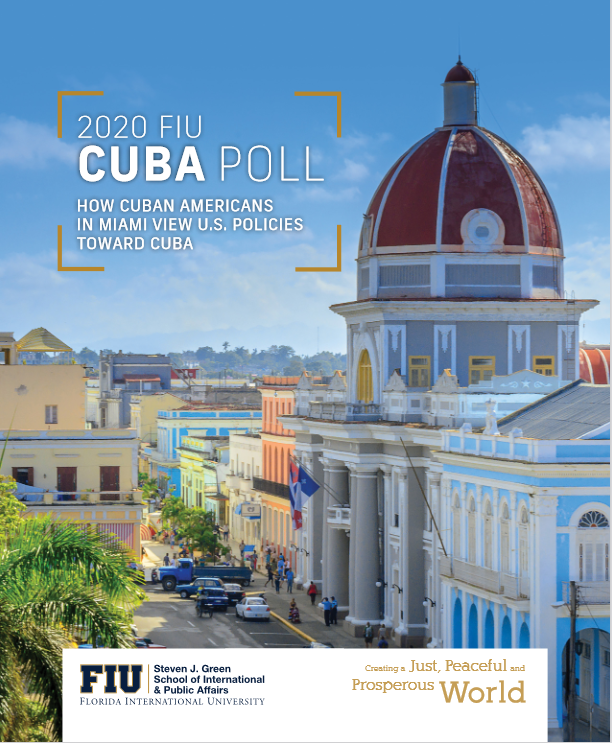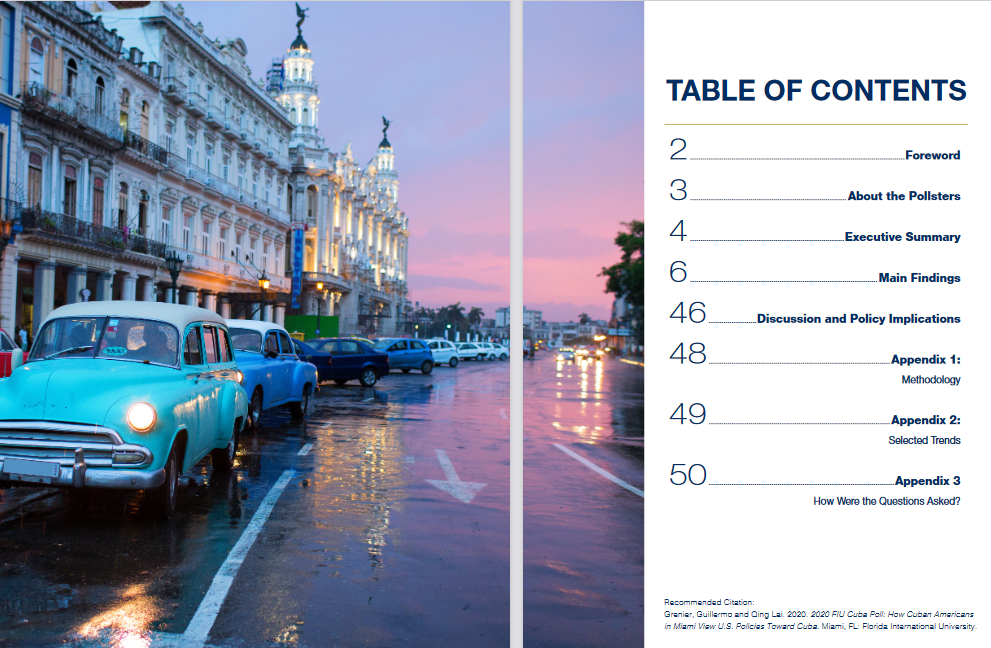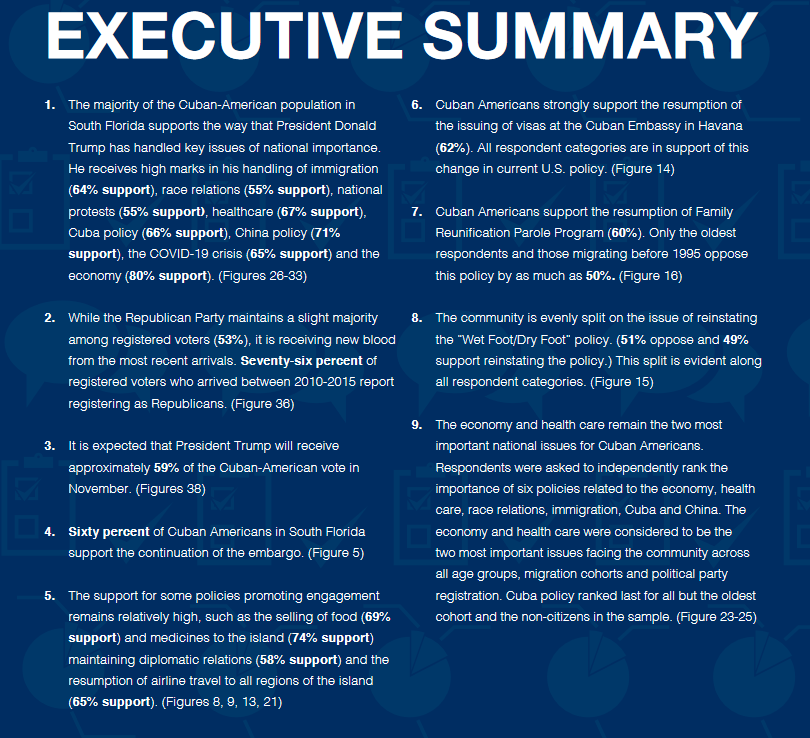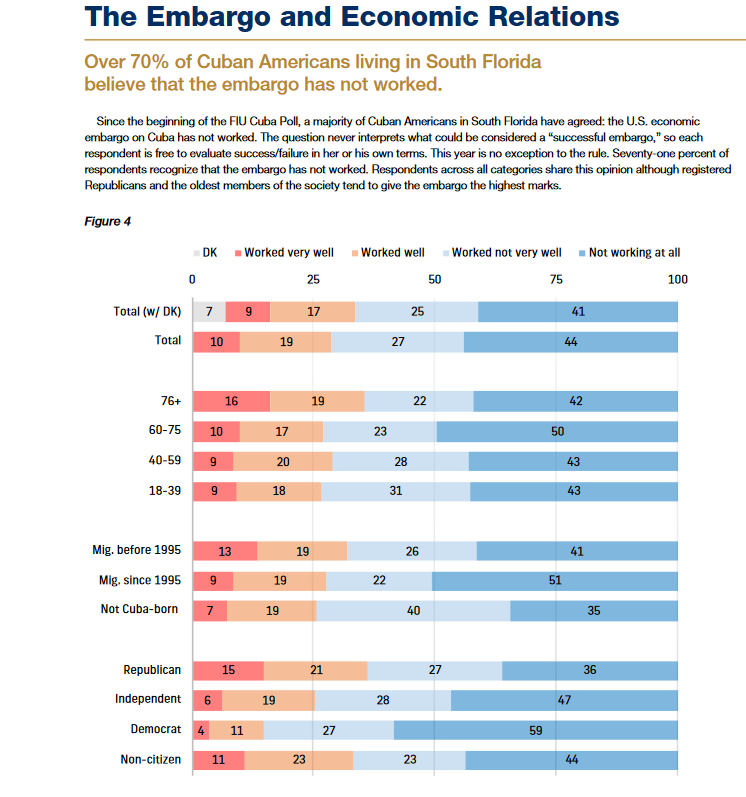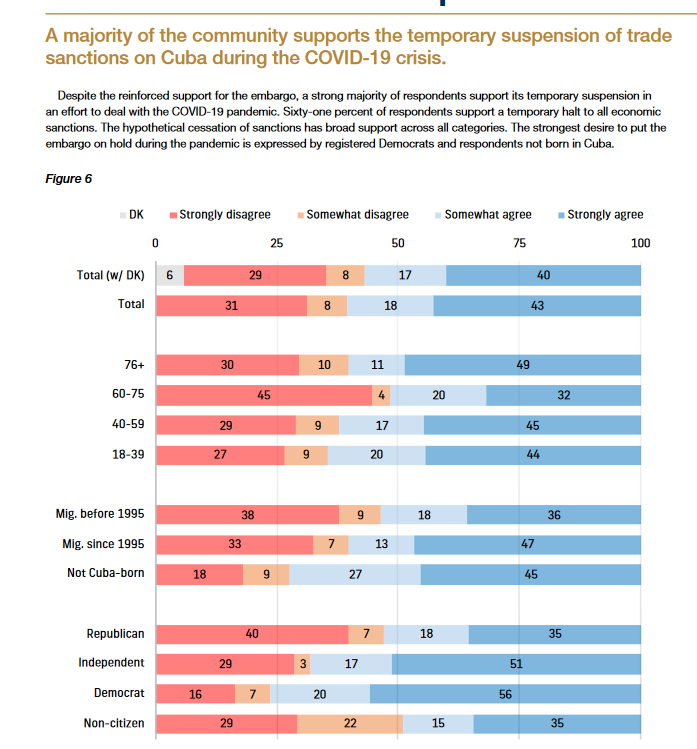Read the full 2020 FIU CUBA POLL report here.
The results of the 2020 FIU Cuba Poll suggest the link between political party and Cuba policy preferences among Cuban-Americans is not as clearly defined as it used to be. Put another way, although a majority of Cuban-Americans respond postively to Trump’s anti-socialist rhetoric, most still support engagement policies that help the Cuban people.
To illustrate, when asked to rate Trump’s performance in a host of national issues ranging from his handling of immigration and healthcare to Covid-19 response, responses split along partisan lines, with roughly two-thirds consistently in favor of the Republican president. This was also true when respondents were asked to rate Trump’s handling of “Cuba policy” (66% in favor). But when respondents were asked about support for individual components of Cuba policy without mentioning Trump, political parties or “the embargo,” the partisan lines disappeared and previous trend lines in favor of engagement resurfaced, with U.S.-born Cuban-Americans and recent arrivals leading the way:
- 56% support diplomatic relations between the U.S. and Cuba.
- 57% support the temporary suspension of trade sanctions on Cuba during Covid-19.
- 69% support the food sales to Cuba by U.S. companies.
- 71% support the sale of medicine to Cuba by U.S. companies.
- 58% oppose the suspension of visas services at the U.S. Embassy in Havana.
- 58% support the resumption of the Cuban Family Reunification Program (suspended in 2019).
Support for unrestricted travel to Cuba—for Americans and Cuban-Americans alike—did drop below 50% for the first time since the Bush-era, with cruise ship being the least popular (40%). Yet, 62% favor allowing U.S. commercial airlines to re-establish routes throughout the island, not just to Havana. This suggests that while a majority of Cuban-Americans may now favor some restrictions on U.S.-Cuba travel, they remain lenient on what those may be.
Notably, on questions that define U.S.-Cuba policy in terms of “carrots” and “sticks”, strong majorities supported a combined approach: 68% favor policies “designed to put maximum pressure on the Cuban government” while 66% support policies directed at “improving the economic well-being of the Cuban people.” In other words, the Obama-era view that “U.S. policy should be tough on the government but soft on the people” continues to hold firm. So has the shrinking salience of U.S.-Cuba policy among key election-year issues for Cuban-American voters, ranking below the economy, healthcare, race, immigration and even China policy across party affiliation.
Perhaps the most significant number in the poll is the percentage of newer émigrés who identify as Republican: a whopping 76% of those who migrated to the United States between 2010 and 2015. Paradoxically, these are also the Cubans-Americans who most frequently travel to Cuba, maintain relations on the island and favor most of the same engagement policies that their Republican representatives so ardently strive to dismantle. This contradiction is shaped by too many factors to explore here. The appeal of Trump’s strongman/ business mogul persona and anti-socialist bombast is certainly one of them. Yet it is also true that these migrants harbor deep antipathies toward a Cuban government that did precious little to seize the opportunity for reform presented by President Obama’s diplomatic opening. Their party affiliation likely represents a rebuke of the system they left behind more than a defined ideological orientation. Nonetheless, this should serve as a wakeup call for Cuban officials. Those who arrived between 2010 to 2015 aren’t batistianos. They are a direct product of the Revolution. By continuing to resist meaningful reforms, the Cuban government runs the risk of forging a new generation of aggrieved exiles supportive of U.S. presidents who take a hardline approach against Cuba.
Finally, there are important lessons here for whoever wins the White House come November. Should it be Joe Biden, reversing Trump’s most hurtful measures toward Cuba in his first 100 days will be popular among Cuban-Americans. These include the re-establishment of island-wide commercial and charter travel, lifting remittance limits, re-opening consular services and fully staffing the U.S. Embassy in Havana. For Trump, the FIU poll suggests that Cuba sanctions have a political ceiling, which his policies reached long ago. In a second term, Trump could ease harmful restrictions on travel, remittances, and some trade in pursuit of a “better deal” without losing support.
“The poll estimates about 52.6% of Cuban Americans in Florida are registered Republicans compared to 25.8% who are registered Democrats and 21.5% who are registered independent.” (NBC Miami, October 2, 2020)
Read the full 2020 FIU CUBA POLL report here.

